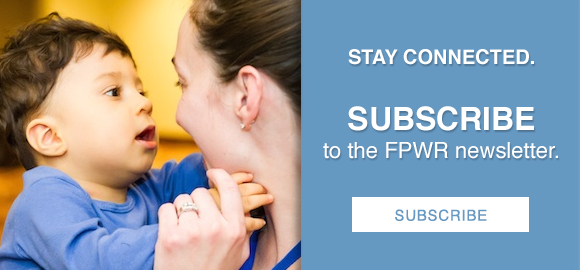In this 60‑minute workshop, Melanie Silverman explains optimal nutrition for children and adults with Prader‑Willi Syndrome. She includes online resources and gives tips on how to handle feeding times and varying diets. The session includes Q&A from participants in the 2020 FPWR Virtual Conference.
Click below to watch the video. If you're short on time, scroll down for timestamps to find the portions you're most interested in.
Presentation Summary With Timestamps
1:56 Melissa Demand introduces Melanie Silverman
- Melanie Silverman, MS, RD and IBCLC, has been working with parents and children diagnosed with Prader‑Willi Syndrome since 2004
- She tells PWS parents to begin by examining their own relationship with food and nutrition.
- She’ll emphasize that the kind of diet which offers sources of protein, fat and “good” carbohydrates are a good source of nutrition in PWS.
- Another one of her objectives is to discuss how to feed a family and the importance of planning meals and exercise.
3:27 Melanie Silverman presents
What nutrition is and what it looks like:
- It’s important to take a look at what your relationship with food is like.
- Nutrition isn’t black and white.
- There isn’t any magic food or supplement that can help everyone with PWS.
7:19 Macronutrients and micronutrients
- Protein, Fat and Carbohydrates are macronutrients, and the vitamins and minerals are micronutrients.
- Protein has 4 calories per gram, and some examples are chicken, eggs, salmon and cheese.
- Fat has 9 calories per gram and some examples are avocados, or oils.
- Carbohydrates also have 4 calories per gram, and they include fruits and vegetables, as well as grains.
- There is a general perception that there are two types of carbohydrates: “good” and “bad”.
- Food can be a mixture of all three macronutrients: carbohydrates, protein and fat. It can also be a mixture of just two, or it can just be one of them.
10:25 Taking a closer look at food
- The number of servings per container in a Nutritional Facts label times the amount of calories per serving is the total calories per container, and this is why it’s important to read nutrition labels.
- It’s important to eat fresh food that doesn’t come with a nutritional label (such as an apple).
- Talk to your doctor before starting any new diets, and incorporate variety in your food choices every day.
- When making food choices for your child, it’s important to offer a variety of choices, and to stay away from low carbohydrate diets that restrict entire food groups.
- You can go too low‑carb, and that can be dangerous for the pediatric population.
- Nutrient dense food choices can be “meal makeovers” for the typical foods, such as:
- Replace cereal, milk and grapes with oatmeal, milk, cinnamon and pecans.
- Replace tuna on bagel, pretzels and an apple with tuna on wheat bread or tortilla, cucumbers and an apple.
- Replace spaghetti, a salad and garlic bread with eggplant lasagna (roasted eggplant, and berries)
- Replace chicken noodle soup, salad and breadsticks with asparagus, fish and salad.
- Replace tacos with hard shells with a turkey taco salad.
- Replace pasta and cream sauce with spaghetti squash with tomato sauce and parmesan cheese.
- Replace plain bagel and cream cheese with whole wheat toast with peanut butter.
- Replace buttermilk pancakes, eggs and bacon with whole wheat waffle, eggs and bacon.
19:54 Online Resources on Nutrition
- List of links where you can find more information for pediatric nutrition.
20:24 Gastroparesis
- It is slow stomach emptying.
- Symptoms seen in gastroparesis include abdominal distention or bloating, abdominal pain, heartburn, vomiting and regurgitation of stomach fluid into the mouth.
- The risk of gastroparesis is common in children with Prader‑Willi Syndrome.
- It’s recommended to chew food well, stay hydrated, have a varied diet that includes all macronutrients and exercise, as well as monitor stool output.
23:00 Tips to Maintain a Varied Diet in the home.
- Make a Weekly Plan
- Make a list of weekly meals
- Make a shopping list
- Make the shopping trip
- How to feed
- Eat together, as much as possible
- Set limits, and structure and follow through
- Eat a similar food
- No technology while eating
- Lock cabinets and refrigerator to prevent access
- Avoid artificial sweeteners
- Sucralose (Splenda)
- Acesulfame Potassium (Sunett and Sweet One)
- Saccharin (Sweet n’ Low, Sugar Twin)
- Aspartame (Equal, Nutrasweet)
- Sugar alcohols (Erythritol, Isomalt, Malitol, Mannitol, Sorbitol, Xylitol)
- Hydrate well and “negotiate your terms”
- Cucumbers/Lemon
- Crushed mint leaves
- Cinnamon sticks/apples
- Herbal teas
- Orange/Lime
28:20 Exercise is fundamental, especially if there is weight gain in PWS
- Go to your pediatrician and discuss if there is excessive weight gain with them.
- Tracking calories can be useful during short periods of time, but it’s also important to not take a look at the calories all the time.
- Optimal nutrition in PWS includes
- Nutrient‑dense foods and diets with variety.
- Structure meals/snack times/eat together at a table.
- No television or other devices while eating.
- Lock cabinets and refrigerators to keep children/adults safe.
- Intensive, frequent physical activity.
- Follow growth charts and weight carefully along with pediatricians, who can help you understand your child’s growth and development.
- Watch closely for signs of any gastroparesis.
- Also, speak to your doctors about all diet changes.
- Learn as much as you can about Prader‑Willi Syndrome.
36:00 Q & A
Learn more about PWS diagnosis and treatment.








